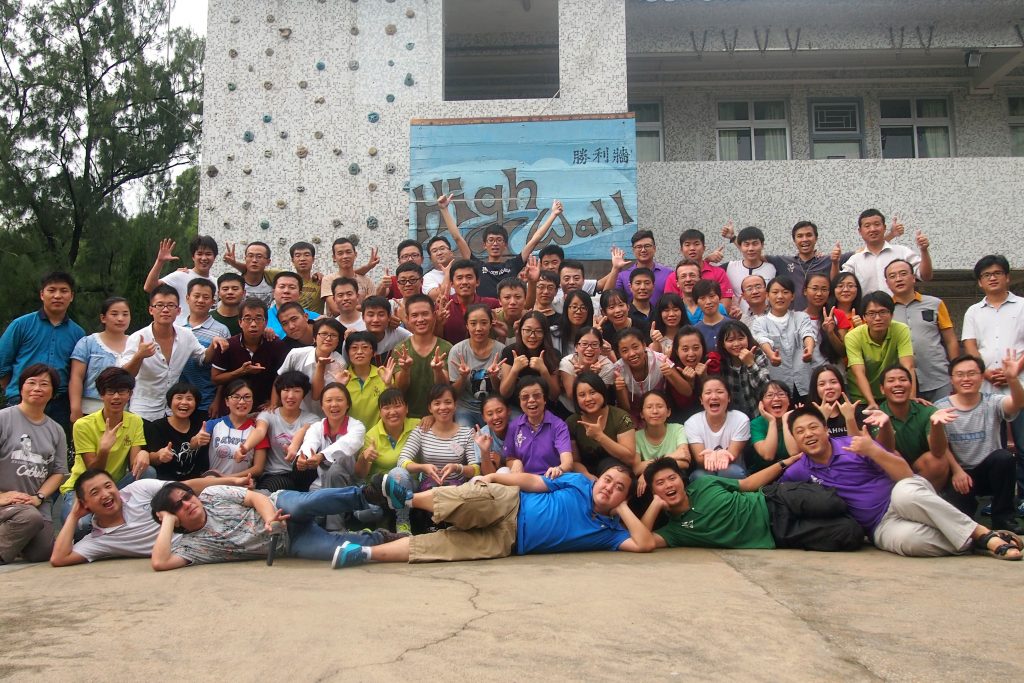
For my thesis I interviewed fifty young Chinese Catholics in fourteen different locations in mainland China. The criteria for these young people was to be under 30 years old and to be actively involved in the life of the local Church. I asked them to tell me about their journey of faith, which they did with great depth and frankness. Their stories constituted the corpus of my thesis, which is summarised under the six points below.
Importance of a fraternal community.
A qualitative survey in a country on the scale of China cannot claim to be statistically representative. But the methodology used makes it possible to present the different stories that were chosen as emblematic of the situation of young Catholics in China. Although each story is unique and no generalisation is possible, nevertheless certain common points appear.
The stories present a before and an after, a feature that highlights a process of inner transformation. Previously, the faith transmitted by the family and by rote learning of the ‘questions and answers’ catechism was restricted to a religion of obligations, made up of truths to be believed, commandments to be respected, sacraments to be received and prayers to be recited. Jean Baptiste, one of the young people, reported that when he was a child, Christian life was limited to prayers and prohibitions, which remained external to him. This teaching is ineffective in establishing a personal relationship with God: faith remains in a ‘frozen’ state, at the seed stage. This faith is perceived by children as a burden and a straitjacket, which they are not capable of understanding in the face of an educational system that advocates scientific atheism. An analysis of the testimonies of young people leads to a diagnosis of a double deficit of the word of God and the Spirit in the religious teaching received in their childhood.
What triggers the process of ‘thawing out’ of faith for these young people is a brotherly ecclesial experience. Participation in a youth camp, a Bible sharing group, a student community or a training session makes you realize that ‘Love one another’, as taught in the catechism, is possible and attractive, that it transforms life at a deep level and opens up a close relationship with a God of love. This process is felt as a happy experience of freedom and self-expression, through the recognition of brothers and sisters, which creates a path for personal unification and ownership of the faith. It is sometimes even experienced as a process of recreation, as Madeleine, still a catechumen, expresses it: ‘At the start, I was like a puddle of mud, I did not know where to flow and how to move forward and then, in one fell swoop, I was moulded into an integrated person, totally rebuilt together with who I originally was; then there was this connection with God: my originally limited life became linked with the life of God, and I find this very wonderful.’
This process of transformation highlights God’s loving care, the role of community and the generosity of these young people’s responses.
The ideal of community
At the heart of these fraternal ecclesial experiences, what touches these young people resonates with the ideal of the earliest ecclesial communities described in the Acts of the Apostles, the great biblical story of the growth of the word of God through the work of the Holy Spirit. The ideal of fraternal communion – expressed in particular in Acts 2:42-47 and 4:32-35 – which is manifested as ‘one heart and one soul’ and as ‘everything in common’ where no one is left behind in the community, is found in the descriptions that young people give of their communities: the love between brothers and sisters, like that in a family, all equal, in relationships marked by free giving and mutual care, where everyone commits generously. This ideal, which contrasts with the usual relationships in society, attracts young people to the point of making them ‘in love’ with their community, while at the same time being realistic about its limits, the distance from the evangelical ideal and the suffering that this distance can cause.
A process of synodality
If the young people’s stories never mention synodality as such, they refer to it indirectly. They put great emphasis on the participation of everyone, on co-responsibility within the group, teamwork, the importance of valuing the different spiritual gifts each person has, the specific role of the priest, etc. Young people are also well aware that this ideal functioning of the community presupposes a process where everyone is learning and training, and that there is a risk of easily leaving people aside, particularly newcomers, and that certain leaders can be tempted to take decisions on their own. They note the importance of accompanying and supporting Church staff, in particular the priest, but also nuns or lay staff members. Their search to align with the will of God leads to an openness to the Holy Spirit, with whom nothing is impossible, as Francis wrote regarding his projects in the service of other young people: ‘When I had a desire, I would not see the direction to take, but I felt that God would definitely enable me to accomplish it. In fact, at that time, at every step, that is how my mind worked. I said to myself: when my aspiration aligns with that of God, God will inevitably allow me to accomplish it. If God wants this, I want it and God wants it, why wouldn’t it happen?’ This active participation of young people in the life of the ecclesial community, sometimes even in a full-time mission, renews the entire community. Older lay people discover that the mission is not just for priests and nuns, that they also have their place to actively participate in the life of the community. Other possibilities open up to them. With the young people, they too experience new ways of praying, they seek to deepen their faith and give more space to the Bible. The priests themselves are transformed at the youth school. Having for the most part been accustomed to taking decisions on their own and ultimately doing everything on their own, they discover with the young people the richness and beauty of teamwork and the importance of involving lay people in the life of the community, including in the decision-making process. This greatly enriches the life of the Church and renews priests in their own vocations, as evidenced by Thierry, a young priest serving young people: ‘Before I always did everything by myself and I was very tired. Now I am able to share tasks with others and then rely on God myself.In this process, it is not primarily a question of knowing what they received, but that I received a lot: since entering the seminary, I have evolved a lot, the Lord has given me many lessons. And in terms of support, it’s not me who supports them, it’s they who support me. Sometimes, when I supervise them, the changes they undergo also invite me to change. This kind of change comes from within, not an external change or something else. For my vocational path, it is a very good… each training group is a place of renewal for me.’
A transformation of the relationship with God
The essential element in the process of ‘thawing out’ of the faith of young people is the transformation of the relationship with God. They gradually, or sometimes suddenly, discover that the distant and frightening God of their childhood is in fact a God who is close, a friend, a brother who loves us infinitely, to whom we can speak like a friend and in whom we can confide. At the end of his story, Pierre expresses his love for Jesus: ‘Jesus is love, my desire is love, I only desire love.’ He cannot find words to describe the intimacy of his relationship with God: ‘His way of responding to my love… I cannot use words to describe this feeling. I can only experience it.’ Catherine describes this relationship in terms of a union with God: ‘I truly believe that God is in me and that I am in God’, while fixing her gaze on Jesus, ‘the most perfect person’, with whom she shares an ‘intimate relationship’. The same Louise who, as a child, was ashamed of her faith, which she felt was a straitjacket, discovered a great intimacy with Jesus, ‘like in a pot of honey’, to which she joyfully testified to those around her. François-Xavier, an only child, likes to see God as a ‘big brother […] someone who takes care of me’. Young people call the Lord ‘big Brother Jesus 稣哥’ as Cecilia confirms: ‘Very often, I don’t say God, Jesus, all that… we say to him: ‘big Brother Jesus’ […] He is like my big brother , you know that he will never abandon you, that he will be by your side. ‘
The theology of Christ as brother
The brotherhood experienced within the community, which is very attractive to young people, as well as intimacy with the Lord as a ‘big brother’ harks back to the origins of the Church. As Michel Dujarier has shown in his numerous works on the subject, in the first centuries, the common name to designate the Church was the Adelphotes Brotherhood, a neologism from the New Testament (1 Peter 2, 17; 5, 9). This vision of the Church is accompanied by a theology of Christ the Brother that was widely held by the Fathers of the Church, and was based on the writings of Saint Paul who presents Christ as ‘Firstborn among many brothers’ (Rm 8, 29), ‘joint heirs with him’ (Rm 8, 17) and that he is ‘not ashamed to call them brothers’ (Heb 2, 11/Jn 20, 17). This theological approach shows that, on the one hand, Christ became a brother in humanity with us through his incarnation and that, on the other hand, through his death and resurrection, he opens us to divine life, by adopting us in a divine brotherhood, and making us, through baptism in the Spirit, his ‘little brothers’ and ‘little sisters’. With him, our elder brother, we become children of God the Father.
A revolution at the heart of the Church – brotherhood
Starting from the image of Christ as Brother requires us to move away from the clergy/laity duality to hear anew the Master's warning: ‘You have only one master and you are all brothers’ (Mt 23:8) . Now, it seems easier to call Jesus: Christ and Lord than to call him big brother and friend. The first designation can justify a certain ‘hierarchy’, with a distant and all-powerful God, a paternalistic clergy and the faithful held in passivity. The second explodes human patterns and establishes radical equality between all: since the Master, God himself, has chosen to manifest himself as a Brother among his brothers and sisters, the disciple of the Master cannot be other than a brother like the Brother, loving as he loved us (Jn 13:34). Furthermore, starting again from Christ the Friend (Jn 15:15) also invites us to develop a spiritual friendship both with Christ, as did ‘the disciple whom Jesus loved’, and with the brothers and sisters of the ecclesial community.
The theology of Christ the Brother recalls the fundamental equality between brothers and sisters at the heart of brotherhood, not on a moral level (we must love others) but on a theological level: since God adopts us into a divine brotherhood, the only identity that counts is that of brothers and sisters in the Brother. This approach revolutionizes relationships within the Church- Brotherhood and provides a theological basis for synodality, this ‘walking with’ brothers and sisters. Since the Master and Lord, who made himself Servant, Brother and Friend, warns his disciples not to call themselves master or father (Mt 23:8-9), it is a question of drawing the practical consequences and not to be like the scribes who say but do not do (Mt 23:3). Concerning priests – who are brothers among their brothers and sisters – as the Second Vatican Council says (PO 9, 1), they are called to exercise the pastoral service related to Christ the Brother and to love their brothers and sisters, as Christ loves them, that is to say like a big brother and not like a father. Confusion commonly occurs when the priest says ‘brothers and sisters’ to the faithful and they respond ‘my Father’. However, for the priest, acting in persona Christi refers to the figure of the big brother and not to that of the father. A true reform of the Church presupposes allowing oneself to be deprogrammed; for this, a change in vocabulary is necessary: to no longer call priests ‘father’. The same young people who call Christ ‘big Brother Jesus’ also call their priest ‘big brother So-and-so’. In Chinese, the word shenfu (神父) coined by Catholics, literally ‘sacred father’, could be usefully replaced by a new expression muxiong (牧兄), literally ‘pastor- brother’, which places value both on the common identity of brothers in the Brother and the specific function of pastor, acting in the name of the Good Shepherd for service to the community. Such an evolution would also provide encouragement for a move from the concept of support (guide) to that of companionship. Rather than insisting on the concept of a guide, which can relate to a teacher/taught dialectic, the concept of ‘travel companions’ places emphasis on ‘walking with’, on the same level, and being prepared to let each other be moved by this companionship.
This is the brotherly and synodal image of the Church that young people in China are helping gradually to emerge and which relates to the theology of Christ the Brother in the first centuries of the Church.
Fr Bruno Lepeu, MEP
- Jeunesse de Chine (Canton)
- Canton, Chine
- La soutenance de thèse du P. Bruno Lepeu
- Jeunes et laïcs sont impliqués dans la vie paroissiale
- Baptêmes à la cathédrale de Canton, Chine





